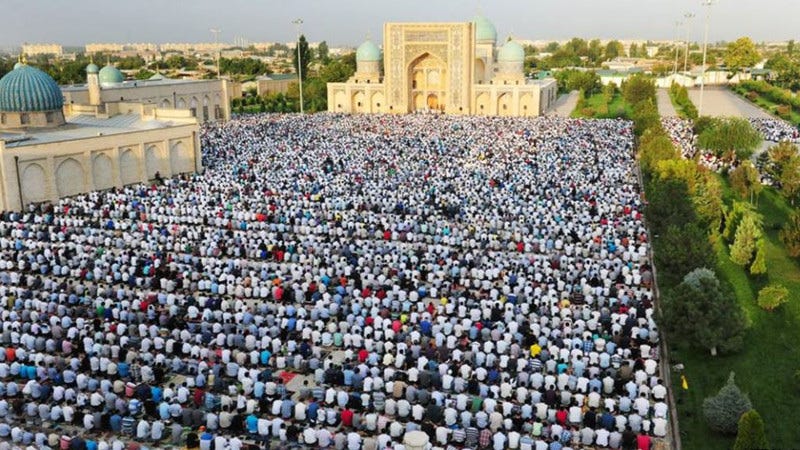What explains the global religious divergence?
Why did the Muslim Brotherhood take off in the 1970s?
Why is Pentecostalism thriving in Latin America?
What explains rising religosity in post-Soviet Central Asia?
Why is weekly prayer highest in Sub-Saharan Africa?
Why has Catholic Ireland rapidly secularised?
A wealth of evidence suggests that economic downturns, natural disasters, epidemics, and conflict motivate demand for social cooperation, cultural tightness, norm policing and strict theology. Peace and prosperity, meanwhile, encourage secularism.
Here’s a brief survey of brilliant books and papers:
In Egypt, ‘modernization’ became discredited by economic stagnation and defeat by Israel. Clerics declared that economic and military failures were punishments for aping the West, and called on men to restore piety. Alongside rising unemployment, frustrated graduates found solace in religion. The Muslim Brotherhood amassed followers by offering social services and righteous purpose.
After the 1980s farm crisis, Americans turned to God.
In Brazil, economic downturns increased Pentecostalism, but not in areas with better social protection. This short-term negative shock in the 1990s had long-lasting effects on culture and politics, entrenched through public performances and institutions. Pentecostal churches expanded their infrastructure; Pentecostal candidates amassed power and introduced more religious bills; alongside more votes for Bolsonaro.
When Brazilian exports plummeted in the 2010s, affected Evangelicals attended more church services. Signalling commitment enables access to member-only services: health, education, and jobs. Evangelicals increasingly voted against the PT - likely due to persuasion from religious leaders.
Earthquakes increase religosity, especially among districts rarely hit by earthquakes. Pakistanis whose homes were completely damaged by an earthquake were also much more likely to be religious.
War increases religosity. Intense conflict in Uganda, Sierra Leone and Tajikistan drove support for religious groups and rituals. Conceptions of God also seem to change after conflict: people are more likely to see him as punitive. Fear of eternal damnation may preserve order and lower cheating.
COVID-19 induced a massive upturn in prayer. Google searches for prayer (as a share of all searches) searches rose by 30%, the highest level ever recorded.
Ireland was staunchly Catholic: pre-occupied with social respectability, public piety and sexual policing. 37% of the population came to see the Pope in 1979. But Irish people have since secularised. Rising prosperity has since catalysed individualism and secularisation, while free media enabled activists to denounce clergy as abusive hypocrites and campaign for the legalisation of abortion.
Multiple motivations
Contrary to some economics papers, there are no simple stories, nor can they be reduced to an instrumentalist desire for club goods. “Every night I pray for a miracle”, remarked one woman I interviewed (ill with suspected cancer). Motivations are multiple (for each person and within communities). Desires may include:
Desperation for a cure;
Community belonging;
Closeness with God;
Member-only benefits, secured by publicly signalling commitment; or
Social approval, achieved by conforming with a crowd that is increasingly pious.
Systematically, though, all seem heightened by negative shocks. This theory helps explain why weekly prayer is highest in Afghanistan and Sub-Saharan Africa.
Institutions matter
Economic shocks can induce religosity. But institutions shape the possibilities for cultural entrepreneurship.
Churches and mosques cannot exploit demand for piety when threatened by violent repression (as under the USSR). Fearing incarceration, religious leaders cannot satisfy demand for community belonging nor can they incentivise strictness with member-only benefits. People may well pray at home, discreetly, but this doesn’t catalyse a positive feedback loop. Stamped out of the public domain, others don’t think that piety is necessary for social approval.
It’s the conjunction of negative shocks, media freedoms and technology that enables clerics to build their faith through cultural entrepreneurship. Over the past 30 years in Uzbekistan, public piety has emerged when people are not scared by repression.










How do economic downturn affect religiosity in countries with strong safety nets?
Religion is a service industry. If it focuses on providing 'normal'- i.e. income elastic- goods and services- it flourishes with rising prosperity. Hinduism used to be a 'Giffen good' for my class. If your income and life-chances shrank, you consumed more of it. If you became richer you became less observant. Then, suddenly, Religious goods and services were remarketed for a rising middle class. Going on pilgrimage was like going on holiday to a nice resort. I recall asking a Bihari shopkeeper in Delhi where the nearest temple was. He recommended the new Swaminarayan temple but mentioned that though it was very clean, still prayer there was efficacious. In other words, orthopraxy was no longer associated with dirt and beggars and flies.
What explains different income elasticities for religion in different regions is average family size. There is a consumption externality for family worship as opposed to individual observance.
It must be said, when things are utterly dire, demand for Religion collapses along with everything else. Such has not been the case almost everywhere during my lifetime.